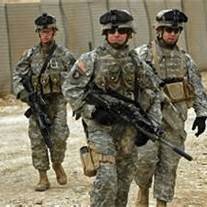 Though my own military career is long behind me, I still reflect on the valuable lessons I learned while serving in the Army. My commitment as a lawyer has been greatly enhanced through learning leadership as a young lieutenant in the 82nd Airborne Division and later as an officer in a Psychological Operations unit. I want to salute my fellow veterans today for the sacrifices they make daily of their personal safety, comfort, and family life – all for us!
Though my own military career is long behind me, I still reflect on the valuable lessons I learned while serving in the Army. My commitment as a lawyer has been greatly enhanced through learning leadership as a young lieutenant in the 82nd Airborne Division and later as an officer in a Psychological Operations unit. I want to salute my fellow veterans today for the sacrifices they make daily of their personal safety, comfort, and family life – all for us!
I would also like to share an article written by a young woman who is a disabled veteran trying to move on with her life after sacrificially serving in our military. I trust her story will make all of us more sensitive and willing to look for opportunities to show exceptional kindness, appreciation, and sensitivity for those faithful men and women who have served and may be working to overcome life-long challenges resulting from that service.
From Amanda C., Disabled Army Veteran:
“As Veterans Day approaches, may I share a few guidelines that can be helpful when interacting with veterans or service members?
- It is never OK to ask a veteran if he or she has killed someone or to joke about it. If we have, we can’t even talk about it with our spouses, much less a stranger.
- When you thank us for our service or pay for our meal, it is really appreciated. We also appreciate packages and notes.
- Please don’t tell us that wars are a waste of dollars or lives or were fought for oil. What we hear is that, in your opinion, our best friend died for nothing. We know many people disagree with war, but it’s better to keep your opinions to yourself.
- Many of us now have PTSD. If you see us acting anxious or moving away from crowds, simple kindness or a little distraction will be appreciated. Talk to us about something interesting and give us some breathing room.
- Please remember that 15 percent of those who serve in the military are women, and some have been in combat. It’s better to ask, “Are you a veteran?” rather than, “Was your husband a soldier?”
- As with any person who has a disability, please do not stare at us. We can be sensitive about our scars or injuries and would prefer not to be asked to relive a difficult experience by being quizzed about what happened. Please also understand that war injuries today are very different than in the past and are often not visible. It is not OK to tell someone they “don’t look disabled.”
- Those of us with disabilities appreciate light conversation and assistance if we look like we are in need.
It was my pleasure to serve our country. — AMANDA C., U.S. ARMY DISABLED VETERAN”
Source: The Dominion Post, November 8, 2012
Submitted by the Robinette Legal Group, PLLC: Morgantown Personal Injury Attorneys. Visit us at http://www.robinettelaw.com or call anytime 304-594-1800.

